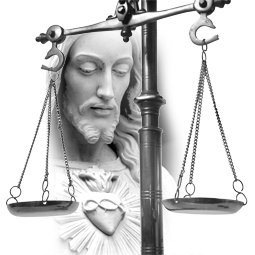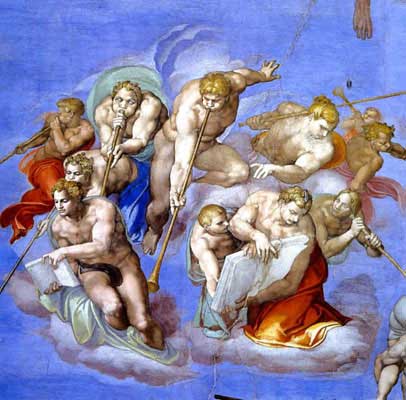“Then the king will say to those at his right hand, ‘Come, you that are blessed by my Father, inherit the kingdom prepared for you from the foundation of the world; for I was hungry and you gave me food, I was thirsty and you gave me something to drink, I was a stranger and you welcomed me, I was naked and you gave me clothing, I was sick and you took care of me, I was in prison and you visited me.’” [Matthew 25:34-36, NRSV]
[L] Scales and Scared Heart, by Louise Webb. [M] Angels in Michelangelo’s The Last Judgment. “Small” book of life to the righteous (Christ’s right); “big” book of death to the damned(Christ’s left). [R] The Last Judgment, by Michelangelo.
Judgment spells “justice”, due punishment and retribution, while mercy bespeaks compassion, forgiveness and unearned-favours. They seem to juxtapose, and even clash. And yet, like the scales of justice and the Sacred Heart, they come as a pair in the divine scheme of things. Justice and mercy, Christians have traditionally understood, are aspects of God’s love. Indeed, as Saint Bernard of Clairvaux suggests, mercy and judgment are the two feet of God; neither foot should be neglected. What does the Last Judgment say about this?
[1] God’s Justice Is His Mercy
In the Nicene Creed, we proclaim our faith “in one Lord, Jesus Christ” who “will come again in glory to judge the living and the dead.” We are all familiar with Our Saviour’s graphic end-time discourse: before the Christ-Judge will be gathered all nations, and he will separate them like a shepherd does – goats (the damned) to his left heading for burning hell, and sheep (the righteous) to his right destined for eternal joy. Pointing to the general judgment of all humankind, these words speak of the Day of Judgment in which our eternal destiny will be sealed.
It would of course be easier to think of mercy from such Bible stories like the prodigal son, the lost sheep, or the woman caught in adultery, rather than from readings on Christ’s second coming “to judge the living and the dead.” But these latter readings are not meant to make our reflection easier; rather, they help us understand more fully the gift and mystery of God’s mercy. The Last Judgment in Matthew 25:31-46 teaches that God’s justice is His mercy. They intersect.
[2] Mercy and Justice Intersect
Mary’s Magnificat (Luke 1:46-55) spotlights this intersection. A canticle that reveals the spirituality of the biblical anawim, it exalts the simple faithful who affirm their poverty by detaching from all idolatry of wealth and power. By humility of heart, they steer free of temptation to pride, and open themselves to saving divine grace. The whole Magnificat is characterized by this profound humility. In a dual movement, Mary first praises the Almighty who has done great things for a lowly servant and then introduces the intersection of mercy and justice in the seven divine works of the Lord of history. He has scattered the proud-hearted, brought down the powerful from their thrones, lifted up the lowly, filled the hungry with good things, and sent the rich away empty. This portrayal of the very essence of who God is and what He does is soon followed by the promise of the Son of God himself in the synagogue in Nazareth as he reads from the Isaian scroll:
- “The Spirit of the Lord is upon me, because he has anointed me to bring good news to the poor. He has sent me to proclaim release to the captives and recovery of sight to the blind, to let the oppressed go free, to proclaim the year of the Lord’s favor” (Luke 4:18-19).
And this is precisely how the public ministry of the Son of God is unpacked in the Gospels, so that when John the Baptist enquires from prison if he is the Messiah, or whether they need to continue searching, Jesus speaks not of some great political and religious achievements but of his work of mercy in favour of the poor and marginalized:
- the blind receive their sight, the lame walk, the lepers are cleansed, the deaf hear, the dead are raised, and the poor have good news brought to them (Matthew 11:4-5).
Clearly, there is no getting away from the mercy of God. As he points to an essential element in the biblical portrayal of the Almighty, Pope Francis stresses that mercy is what pleases God most, not perfect doctrine, harsh laws, or expensive vestments. The question the Pope’s detractors pose is, does this emphasis on mercy not result in a pushover God who lets people do what they please, as and when they please, with impunity? Matthew 25:31-46 corrects such a faulty portrayal. Throughout the Old Testament, God does mighty acts of mercy for the poor and suffering, while he dispenses justice by bringing down the evil-doers. Is there any surprise that Jesus’ discourse on “the end” would bring out the very essence of who God is, in mercy and justice?
Identifying himself with the “little flock”, Christ pronounces Kingdom-award or hell-fire punishment according to one’s treatment of those in need of mercy and assistance. In divine justice, those who receive mercy and yet blatantly abuse and deny it to others with presumed impunity shall find mercy scarcely available to them. So an unmerciful servant who receives mercy from his lord but treats a fellow servant harshly with unforgiveness shall be brought to justice (Matthew 18:21-35).
Some may question how a merciful God can be a “heartless” punishing Judge. Some, in suffering, may lament and question the very existence of God or, if He does exist, whether He even cares. But the Last Judgment affirms the depth with which the Lord of history cares and stands on the side of the least. In the unfolding of human history, the terrain may sometimes seem dark and graceless as the privileged and proud or the heartless and abusive triumph. But, we must ever remember there is a God, and that He will perform great reversals in due time, with terrifying “heat” (see The Rich Man and Lazarus, Luke 16:19-31). That “terrifying” divine justice is divine mercy. Together, they deliver a message of hope to the deserving. Faith says: God will put things right in the end; all tears will be wiped dry. In the end, therefore, every human being from every nation in every period of human history will face divine justice, especially where human justice has failed. Scriptures warn us not to be deceived, that in the end God will not be mocked, and assure us that “whatever a man sows, that he will also reap” (Galatians 6:7). When the time comes: “Multitudes who sleep in the dust of the earth shall awake, some to everlasting life, some to shame and everlasting disgrace” (Daniel 12:2). On that Day, the dead will be judged by what has been written in the books, by what they each has done (Revelation 20:12).
Jesus thus teaches that evil and darkness are not the last word; mercy and justice will ultimately prevail. All this, then, issues in a call to positive collaboration with mercy.
[3] Mercy and Justice in Worship and Discipleship
Disciples of Christ cannot read the Scriptures or examine the life of Christ and not sense that mercy and justice, particularly for the poor and excluded, are dear to the heart of God. “Thy kingdom come, thy will be done, on earth as it is in heaven” must simultaneously be a proclaiming and an active working towards the fulfilling of God’s Kingdom-vision that includes “the least of these.” So credible discipleship enacts in real life the justice and mercy celebrated in worship. We shall no more seek justice than live justly, that justice-work and just-living may in turn contribute to our worship. From the fruits that we produce, we will show evidence of where we are rooted. We are either obedient servants of the Word, or we are its rebels.
The “fear” invoked by the Last Judgment will then issue in ethical responsibility. As St Hilary said, our fear has its place in love. We can do just and merciful acts because in creating justice, the God of mercy is present to us in grace. Throughout Scriptures, God invites us to associate ourselves with the little flock, to really be members of the People of God in purity and simplicity of heart, and in love of God and neighbour. We are called to follow the actions of the Good Samaritan because the parable is a retelling of the entire Gospel where Jesus would not leave sin-injured and death-bound humanity unattended. Likewise for disciples of Jesus, doing mercy becomes the condition for salvation. This is made clear in Matthew 25, where the saved are those who perform the corporal works of mercy. Saint Paul is explicit on this and so is the Catechism. When Judgment Day comes, the lives of all of us will be revealed before the tribunal of Christ, and the truth of each person’s relationship with God will, even to the furthest consequences the good each person has done or failed to do during their earthly life, be laid bare, so that each person may receive their due recompense, good or evil, according to the life they lived (2 Cor. 5:10; CCC 1039).
As Nobel Laureate Albert Camus once said: “I shall tell you a great secret, my friend. Do not wait for the last judgment, it takes place every day.”
Copyright © Dr. Jeffrey & Angie Goh, March 2016. All rights reserved.
You are most welcome to respond to this post. Email your comments to jeffangiegoh@gmail.com. You can also be dialogue partners in this Ephphatha Coffee-Corner Ministry by sending us questions for discussion.
* This article was written for and first published in the March 2016 issue of the CANews.



